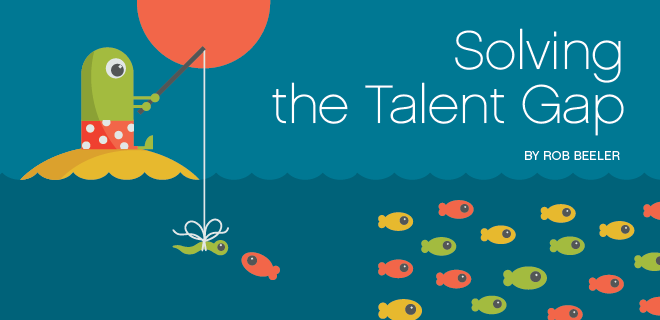
In my years heading up an operations department, I would dread hearing those words. Too often it was someone who wanted to stay with the company, but the allure of more money elsewhere was too much. Sometimes I could keep them with a counter-offer, but that only works so many times before they are out the door for good.
Digital Advertising has more than perception problems. It has more than technological complexity problems. It has people problems. We need to bring new people into the industry and we need to outline a better career path for them.
The anecdotal evidence of this problem is easy to find. Ask any ad operations manager with some years under their belt and they will share how they saw great people depart for better pay and struggled to fill the open positions.
Once someone left, I was stuck with two options: post a job or poach someone from another company. Considering the pay offered, it was always surprising to me how few people with the proper skills would apply. Poaching simply perpetuated the same vicious cycle that left me with the open position in the first place. New York City can be like a soap opera and it becomes hard to remember who is with whom as people jump from one company to the next, making more and more money each time.
It’s as if ad operations is a secret club and for those in the know. They can game the system to achieve higher and higher salaries until they find themselves stuck trying to manage others doing the same thing. It’s got to stop.

All of that is anecdotal; but, with this year’s AdMonsters Salary Survey, we’re starting to see this information in the numbers. Of the 250 people who filled out the survey, only 36% had worked for one company. On average, people who have worked for more than one company made 20% more than those that had only worked at one.
From a career perspective, it can make sense to work for multiple companies, especially if it’s in different parts of digital advertising. My argument isn’t thatchanging jobs is bad for an individual or the companies hiring these people. But, the downside is, while we are still short on talented people in the space, there is a cost for people moving on. When small teams lose members, projects are delayed, put on hold or abandoned. When I hear people in the industry wonder why publishers don’t move quickly enough, the reason alone isn’t a lack of vision or understanding, but in having an experienced team creating operational efficiency for the company to move forward. Churn prevents these teams from getting there.
parts of digital advertising. My argument isn’t thatchanging jobs is bad for an individual or the companies hiring these people. But, the downside is, while we are still short on talented people in the space, there is a cost for people moving on. When small teams lose members, projects are delayed, put on hold or abandoned. When I hear people in the industry wonder why publishers don’t move quickly enough, the reason alone isn’t a lack of vision or understanding, but in having an experienced team creating operational efficiency for the company to move forward. Churn prevents these teams from getting there.
The keys to solving this problem are to have strategies to retain people longer and to bring in new people into the industry. Having a larger pool of qualified people – some new blood – will help fill open positions faster. I suspect it’ll also reduce the amount of jumping from job to job overall.
A key component to bringing in new blood to ad operations in making sure people know it’s an option. My request for everyone is to take the following information to the university they attended and work with them to get the word to students. For some universities, advertising courses are about selling the dream of being on the creative side and becoming the 21st century version of “Mad Men.” It’s a sexy pitch, but very few people get to come up with the next Coke commercial. While operations is more vocational, for the right individuals it’s a much better fit.
(Above: Avg. starting salaries for people without previous ad ops experience.)
We’ve included some information from our annual salary survey to help spread the word. Sharing the salary by years of experience can help show that ad operations can be a well-paid career. We’ve also included starting salaries by region and industry segment and the top ten traits potential employers are looking for.
When asked if they would hire people without previous ad operations experience:
- 78% of publishers (media companies) said yes
- 70% of solution providers (tech companies) said yes
- 50% of media buying ad agencies said yes
- 44% of ad networks said yes

The 2014 Salary Suvery explores over 30 data points on ad operations roles within publishers, agencies, networks and solutions companies from over 320 respondents in North America, and provides data on salaries by position, seniority, geographic area, number of reports, as well as historical trends and other key findings.
The full Salary Survey report is available for just $199 and includes an AdMonsters Membership*. If you are already an AdMonster Member, the report is free.
Download the full report ($199, includes Membership)
or
Download summary report (free)
*AdMonsters Members get access to all of our premium content throughout the year, including surveys, conference content, webcasts, as well as other Members-only networking features. AdMonsters members renew every 12 months.